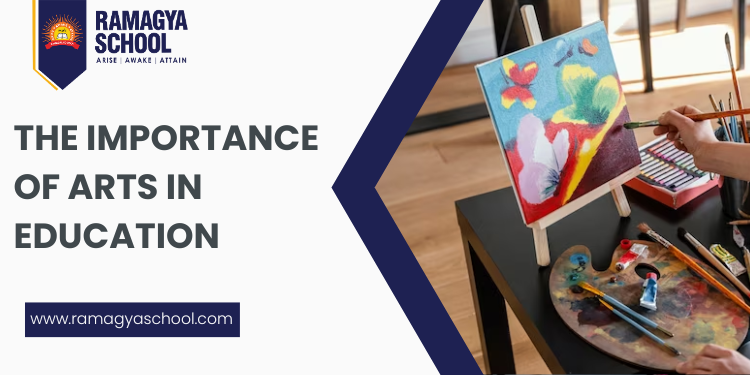In today’s fast-paced and technology-driven world, it’s easy to overlook the significance of arts in education. However, Ramagya School, with its unwavering commitment to nurturing each child’s unique potential, recognizes the profound importance of incorporating arts into the educational journey. At Ramagya, we believe that the arts are not just subjects to be taught; they are pathways that lead students to discover themselves, express their inner thoughts, and ultimately become the best versions of themselves. In this blog, we’ll explore the myriad reasons why arts in education are so vital.
Why Arts Important in Education?
- 1. Self-Expression and Creativity: Arts in education provide a platform for students to express themselves freely. Whether it’s through painting, music, dance, or drama, the arts empower students to channel their emotions, thoughts, and ideas into tangible forms. This process of self-expression not only boosts their confidence but also encourages them to think outside the box and explore their creative side.
- Fostering Individuality: Ramagya School firmly believes that every child is unique. By integrating arts into education, we acknowledge and celebrate this individuality. Arts allow students to discover their own strengths, interests, and talents, helping them develop a strong sense of self-identity. When children recognize their uniqueness, they are more likely to strive for excellence in all aspects of their lives.
- Enhancing Critical Thinking: Art education encourages students to analyze, interpret, and critique various forms of expression. Whether they are dissecting a piece of literature, interpreting a painting, or deconstructing a musical composition, students develop critical thinking skills that are invaluable in all areas of life. These skills help them become more analytical and open-minded individuals.
- Improved Academic Performance: Studies have shown that students engaged in arts education tend to perform better academically. The discipline required for practicing an instrument, memorizing lines for a play, or perfecting a dance routine can translate into improved focus and dedication in other subjects. Additionally, the creative thinking nurtured through arts often leads to innovative problem-solving abilities.
- Emotional Intelligence: Artistic endeavors foster emotional intelligence by encouraging students to explore and understand their own emotions and those of others. This heightened emotional awareness helps students develop empathy, compassion, and effective communication skills, making them more socially adept individuals.
- Building Confidence: Participating in the arts boosts self-esteem and confidence. When students see the results of their creative efforts, whether it’s a beautifully crafted sculpture or a captivating performance on stage, they gain a sense of accomplishment. This newfound confidence extends to other aspects of their lives, enabling them to tackle challenges with greater assurance.
- Encouraging Teamwork: While arts often offer individual expression, they also provide opportunities for collaboration and teamwork[1]. Group performances, ensemble music, and collaborative art projects teach students how to work together, compromise, and appreciate diverse perspectives. These are essential skills for success in any field.
- Cultivating a Lifelong Love for Learning: Arts in education foster a passion for learning that extends far beyond the classroom. When students discover the joy of creating and expressing themselves through the arts, they are more likely to develop a lifelong love for learning and exploration.
- Stress Relief and Well-being: In today’s fast-paced world, stress and anxiety can affect students’ well-being. Arts offer a therapeutic outlet for these emotions, providing a healthy way to cope with stress and find inner peace. Engaging in creative activities can reduce anxiety and improve overall mental health.
- Preparing for a Diverse World: The arts are a universal language that transcends cultural boundaries. Exposure to different forms of art helps students appreciate diversity and understand the world from multiple perspectives. In an increasingly interconnected global society, this cultural literacy is invaluable.
At Ramagya School, we are committed to nurturing every student’s creative potential and helping them become the best versions of themselves. By recognizing the importance of arts in education, we empower our students to explore their individuality, cultivate critical thinking skills, and build the confidence they need to succeed in all areas of life. We understand that the arts are not just subjects but gateways to self-discovery and personal growth. So, whether it’s through painting, music, dance, or drama, we encourage our students to embrace the arts and embark on a journey of lifelong learning and self-expression. After all, at Ramagya, we believe that every child deserves the chance to shine and be their unique, brilliant selves.
Read our Article: Nurturing Tomorrow’s Innovators: The Importance of Science Education in Schools





